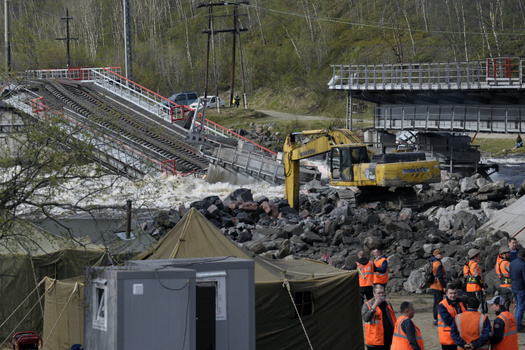
Bridge collapse during flooding in the Murmansk region interrupts rail connections with regional capital and port
Мы говорим как есть не только про политику. Скачайте приложение.
A flood in the Murmansk region damaged a railway bridge across the Kola River in northwestern Russia. As a result, passenger and freight trains along the Vykhodnoy – Kola line, connecting the village of Vykhodnoy to the regional capital of Murmansk, have been suspended.
One of the railway bridge’s five pillars collapsed on May 30. The supporting pillar was washed away by the Kola River, which overflowed its banks due to a drastic melting of snow-cover. This caused the surface of the bridge to collapse.
The bridge’s support pillars had “barely been strengthened” in the past 90 years, said Andrey Chibis, the Murmansk region’s governor. The Murmansk Transport Prosecutor’s Office is currently investigating the incident, and in turn said that the bridge was repaired in 2014. The prosecutor’s office is planning to verify that there were no violations during the repair and subsequent operations of the bridge.
Rail links with the city of Murmansk have been interrupted until repair work is complete, Russian Railways announced on June 1. “The wagons are parked. Murmansk is closed. [There are] a bunch of ‘abandoned’ trains,” Interfax reported, citing a source from one of the companies working in Murmansk.
Estimates on the restoration time are greatly varied. According to the Murmansk region’s governor, repair work “will take two to three weeks.” The old pillars will be taken down and replaced with new ones, Chibis said. However, Kommersant writes that according to experts, the time period given by the authorities would only allow for the construction of a temporary structure, which trains would not be able to travel along at normal speeds or rates. Building an entirely new bridge would take 6 months to a year, experts estimate.
Train stoppages are also affecting companies operating through the Murmansk port. In particular, this has affected logistics for Russia’s largest coal company, the Siberian Coal Energy Company (SUEK), which co-owns the Murmansk Sea Port and uses it to transport its coal. SUEK told Kommersant that it is continuing to export coal through the port of Ust-Luga in the Leningrad region (west of St. Petersburg, this port is on the Luga Bay of the Gulf of Finland). That said, Kommersant notes that not all cargo can be redirected from Murmansk to other ports. Meanwhile, Russian Railways maintains that all traffic volumes will be restored in full immediately after the bridge is repaired. However, the company has yet to announce approximate dates for when rail travel to and from Murmansk will resume.
A criminal case has been launched in connection with the collapse of the bridge. The Murmansk Transport Investigation Department has launched a criminal investigation for the violation of regulations on traffic safety and the operation of transport.